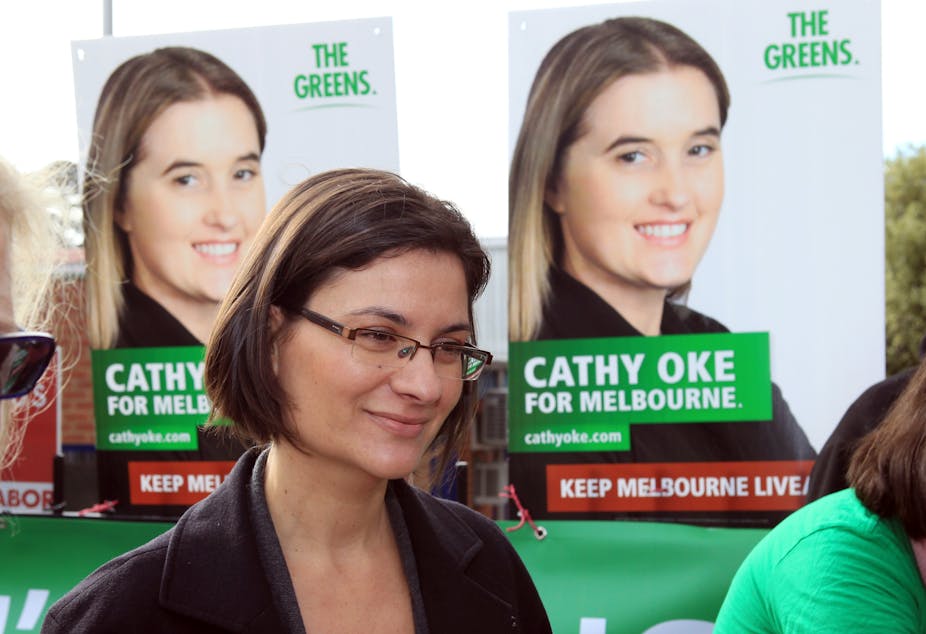The outcome of the Melbourne by-election, in which Labor has claimed a narrow victory, reflected a disappointing performance from the Greens. At the 2010 state election Labor’s victory was dependent on Liberal preferences. In the absence of a Liberal candidate, the Greens were favoured this time.
Personal votes count for less in Melbourne than in other electorates due to the seat’s high population turnover, but even so, the retirement of veteran Labor MP Bronwyn Pike should have worked in the Greens’ favour, just as the retirement of Lindsay Tanner did when Greens MP Adam Bandt won the federal seat of Melbourne in 2010.
The Greens comfortably outpolled Labor on primary votes 36% to 33%. Their defeat was on the basis of preferences. Some of this reflected Labor’s superior ability to wheel and deal. The Sex Party in particular did the Greens some damage, rather as “Pirate” parties in Europe have drained votes from the radical left. But in a contest between the centre-left ALP and the further left Greens, it would be expected for more conservative voters to support Labor.
To some in the ALP, the Melbourne result will reflect the success of their recent verbal offensive against the Greens, in particular on asylum seeker issues. In a very close contest anything is possible, but the asylum seeker issue is bewildering and complex, and few fully understand it. It serves to confirm existing party choice rather than challenge it, rather like Obamacare in the US.
Canberra insiders wildly overestimate the impact of political rhetoric on voter choice. Labor’s ritualistic evocations of its “cause” and the “true believers” leave voters about as bemused as the Greens’ strange calls for voters to “make history”. Instead, Labor’s relatively strong performance in Melbourne was a reflection of voters’ feelings about state politics.
The Greens campaign in Melbourne was curiously centred on local issues, as if it were a council byelection. Issues of planning, sustainability and liveability were at the forefront of their appeal. Yet the most distinctive feature of Melbourne voters is that they are left-wing. Hence Labor’s campaign was against the Baillieu Liberal-National government.
Since the surprise election of the Liberals in 2010, those who placed trust in Baillieu’s “small l” liberal pretensions have been largely disappointed by the government’s moves against equal opportunity legislation, cutbacks to the TAFE sector and broader public service redundancies.
Labor’s campaign focused on these issues, the controversial TAFE reforms of the previous Labor government had cost it support but now the party wrapped itself in the banner of traditional Labor causes: “Labor Cares” was the theme. This is the terrain where Victorian Labor feels secure, most of all in the ascendant left in the party. The Greens largely avoided the issue, to their peril.
In the context of closely divided state parliament, Greens candidate Cathy Oke failed to say which party she would support. It is probably the case that Greens voters are more sympathetic towards cooperation with Labor than party activists necessarily entangled in day to day political conflict with the ALP. But it is never clear from Greens spokespeople exactly what the long-term vision of the party is: is it to keep Labor honest or is it to supplant Labor on the political left? The Greens evade this choice using foggy rhetoric that emphasises voting Green as an expression of personal values and commitment: “This time I’m voting Green”.
There are some to whom this discourse is attractive - educated professionals who deal in concepts - but it has a limited appeal to Labor’s constituency for whom work is not a vocation but a chore. Greens champions insist that many individual Greens policies are popular with voters, but the party’s appeal is less than the sum of its parts.
In recent years the Greens have emerged as a major force on the political left. Nobody would have predicted in the 1990s that an alternative party of the left would comfortably outpoll Labor on primaries in an electorate such as Melbourne and force Labor into an embarrassing appeal to right-wing voters.
But Labor survives. At the next federal election Labor will outpoll the Greens by about three to one. Labor supporters are entitled to a little gloating, but they should be careful.
Consider the prospect of an Abbott government introducing legislation for optional preferential voting; and consider the prospects of embittered Senate Greens supporting such a proposal. Labor’s hollow rhetoric of disdain for Green voters would suddenly be exposed. The tight contest in Melbourne shows Labor and the Greens should best regard each other as “frenemies”.

